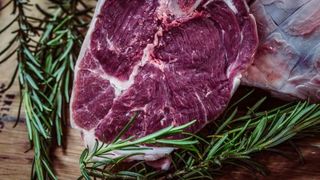So It Looks Like Too Much Red Meat Can Kill You In Eight Different Ways
Overindulging in beef, lamb and pork can increase the risk of death from eight causes

Here’s a chilling roll call of ways to die: cancer, heart disease, stroke, diabetes, infections, kidney disease, liver disease or lung disease – and eating too much red meat increases the risk of all of them.
That’s according to a new study of over half a million Americans tracked for 16 years published in the BMJ, which analysed the link between red meat consumption and the risk of death by anything as well as death from nine different causes (no significant association with death from Alzheimer’s disease was found in the results).
The starkest result was that the 20% of people who ate the most red meat were 26% more likely to die from any cause than the 20% who ate the least.
In contrast, when the amount of meat eaten was the same, the 20% of people who ate the most white meat (which in this case included poultry and fish) saw a 25% reduction in their risk of death from any cause compared with those who ate the least white meat. This suggests switching from red to white meat is a wise move.
The study was observational, so it cannot prove that red meat was responsible for the increased risk. The research also observed a link between increased intake of heme iron (found in all meat) and nitrates (found in processed meat), and the increased risk of death from all causes and the eight specific causes, which could be one explanation for meat’s impact on health.
Current NHS guidelines suggest that people shouldn’t eat more than 70g of red and processed meat a day. That doesn’t amount to a great deal when you consider that an English breakfast containing two sausages and two rashers of bacon adds up to 130g.
Red meat has its benefits too, such as the high amount of iron and B vitamins it contains. It’s also high in protein, although it’s easy enough to get protein from other sources, such as white meats, beans and pulses.
Get the Coach Newsletter
Sign up for workout ideas, training advice, reviews of the latest gear and more.
One easy way to bring your red and processed meat intake in line with the recommendations without having to opt for minuscule portions is to throw in a few meat-free days a week, or switch to white meat (ideally unprocessed) more often. This is also likely to reduce your salt and saturated fat intake, which is no bad thing.
RECOMMENDED: Why You Should Go Part-Time Vegetarian

Nick Harris-Fry is a journalist who has been covering health and fitness since 2015. Nick is an avid runner, covering 70-110km a week, which gives him ample opportunity to test a wide range of running shoes and running gear. He is also the chief tester for fitness trackers and running watches, treadmills and exercise bikes, and workout headphones.
